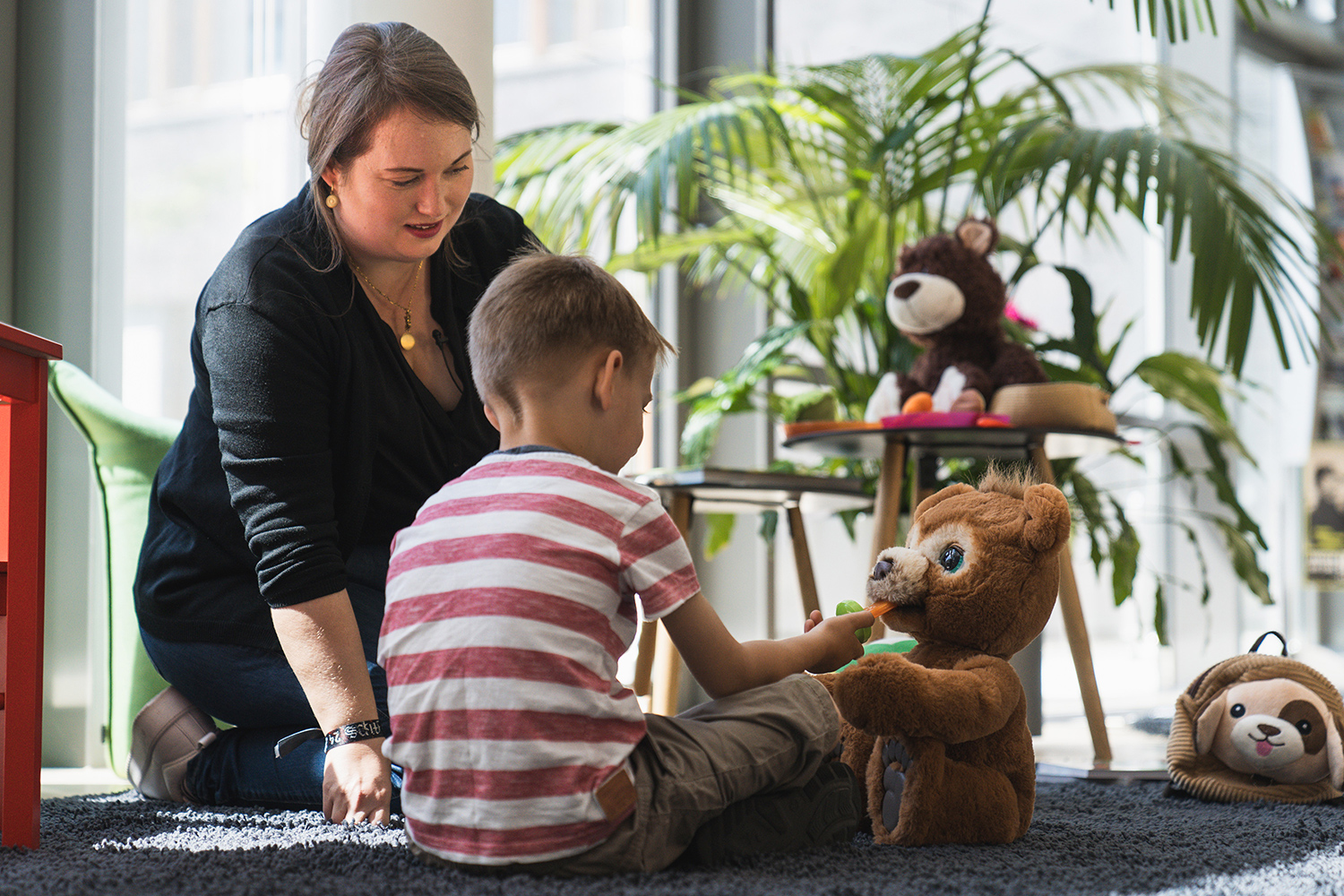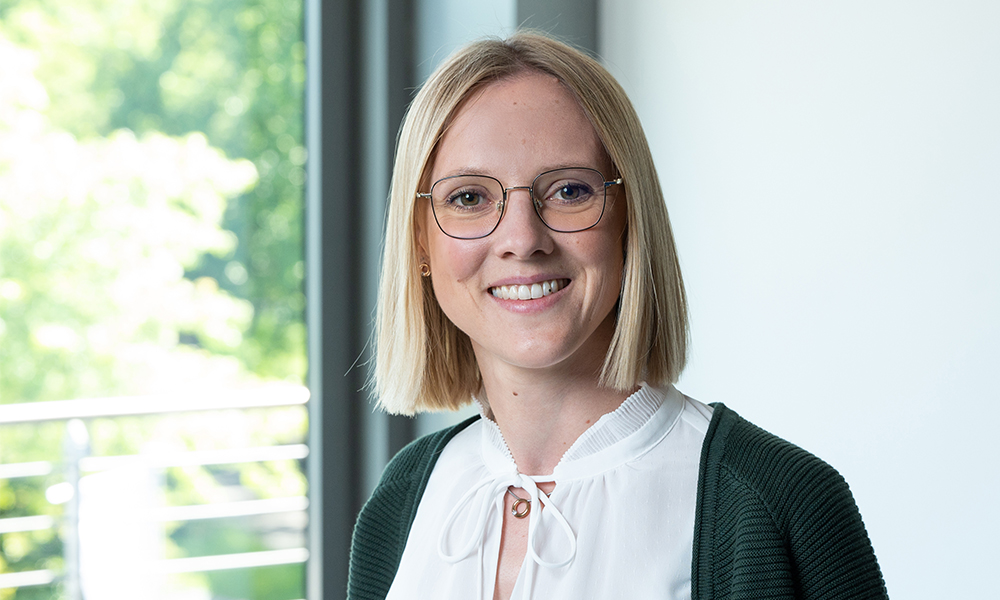Look who’s talking!
Some children learn to talk sooner than others. This makes it difficult to detect anomalies in language acquisition immediately and in the first years of their lives. However, to give children affected by such a developmental delay a good start when they go to school, early support is essential. Together, Fraunhofer IDMT in Oldenburg and the Klett Group are exploring to what extent technological solutions can help nursery teachers to identify support needs.


Children already acquire the most important language basics in the first few years of their lives. Some of them, however, need targeted support: around 7.5 percent of all children of nursery school age display developmental language disorders.¹ To prevent negative consequences at school and foster social participation overall, it is important to detect these and other anomalies as early as possible.¹ This means that an effective analysis and the support of speech and language skills should ideally commence well before the child starts school. The challenge lies in the fact that only experts are able to recognise certain problems in language acquisition that occur at an early age. But not all nursery teachers are specially trained in language development.² This might be the starting point for new technologies.
Recognising and assessing child language
How can intelligent technologies assist in assessing language development? This is the question that the Fraunhofer Institute for Digital Media Technology IDMT and Klett Lernen und Information GmbH (KLI) are currently tackling. Fraunhofer IDMT has been commissioned as a research partner in the KLI project “Speaking for the Future”. “We are examining the extent to which technological solutions in conjunction with linguistic approaches can help in assessing children’s language development. The aim is to give nursery teachers valuable input for assessing a child’s speech and help them to make the right decisions in cases where a child requires support,” explains Laura Tuschen, Head of Assistive Speech and Language Analysis at Fraunhofer IDMT.
A major challenge in the project is the automatic recognition and assessment of child language. During childhood, the language picture changes, sometimes dramatically, over the course of just a few months. In addition, a child’s language development is highly individual and influenced by various factors, such as multilingualism. Fraunhofer IDMT’s role in the project as the technology and research partner is to test the feasibility of automatic speech recognition and analysis in children. The IDMT researchers are also working on ways to transfer concepts into technological applications. “On the basis of existing scientific findings on typical stages in the language development of nursery school children aged around 3 years, we are examining whether it is possible to reliably translate certain features of grammar or vocabulary into technological algorithms. This would allow us to make a statement about the child’s level of language development later on,” explains Tuschen.
Visits to nursery schools
The research and development work calls for language data from children that are collected in scenarios as everyday as possible. That is why KLI, together with the project partners, has conducted scientific studies in Fröbel nursery schools. With the help of mobile technologies, the children’s spontaneous speech was recorded in playful scenarios, always in the presence of the nursery staff and in compliance with the strictest data protection guidelines. The recordings can be used to develop and test technological solutions. In addition, KLI is evaluating the possibilities and requirements for applying a digital language screening procedure in the nursery schools. “To develop a reliable and practicable tool for assessing language development, it is important that science and practice work hand in hand. That is why we are very pleased that Fröbel has given us access to its facilities and thus to important language data as well as the opportunity to engage with specialised staff,” says Jana Aguilar Marquez, EdTech Advisor and Researcher at KLI.
Scientific advice and pedagogical support
Professor Julia Siegmüller, Professor of Therapy Research and Therapy Methodology at EUFH European University of Applied Sciences, is on hand to advise on the development work. She is a patholinguist with many years’ experience in language acquisition in childhood. “This project has the potential to improve early recognition. Especially worth noting is the attempt to spot nursery school children with suspected speech anomalies at a very low threshold. This avoids protracted waiting times where all that happens is that time elapses when the child could already be receiving support,” underlines Siegmüller.
Project partner Fröbel is supporting the project in the shape of practice-oriented cooperation with teachers at its nursery schools. “We are absolutely delighted to be part of this exciting project. Paying attention to children’s language skills as early as possible is very important. After all, the prerequisite for successful language support measures is that they are based on the child’s individual abilities. It is here that teachers need assistance so that they can document these in a way that is integrated into everyday life,” says Georg Alt, Head of the Innovation & International Affairs Department of the Fröbel Group.
Further information on Assistive Speech and Language Analysis at Fraunhofer IDMT in Oldenburg can be found here. An overview of the “Speaking for the Future” language project can be found on the website of Klett Lernen und Information GmbH (only available in German at the moment).
--- --- --- --- --- ---
1 Therapie von Sprachentwicklungsstörungen Interdisziplinäre S3-Leitlinie (Therapy of Developmental Language Disorders, Interdisciplinary Guidelines), 21.12.2022, AWMF Register No.: 049-015 (Working Group of the Scientific Medical Specialty Societies) Deutsche Gesellschaft für Phoniatrie und Pädaudiologie e. V. (DGPP) (German Society of Phoniatrics and Pediatric Audiology) https://register.awmf.org/de/leitlinien/detail/049-015 (last accessed: 26.04.2024)
2 DKLK Studie 2024: Key Facts Bundesweit / (2024 Study: Key Facts Nationwide, German Daycare Management Congress) https://deutscher-kitaleitungskongress.de/digitale-pressemappe-2024/ (last accessed: 26.04.2024)
Hearing, Speech and Audio Technology HSA at Fraunhofer IDMT in Oldenburg
Founded in 2008 by Prof. Dr. Dr. Birger Kollmeier and Dr. Jens-E. Appell, the Fraunhofer Institute for Digital Media Technology IDMT’s Branch for Hearing, Speech and Audio Technology HSA stands for market-oriented research and development with a focus on the following areas:
- Speech and event recognition
- Sound quality and speech intelligibility
- Mobile neurotechnology and systems for networked healthcare
With in-house expertise in the development of hardware and software systems for audio system technology and signal enhancement, the employees at the Oldenburg site are responsible for transferring scientific findings into practical, customer-oriented solutions.
Through scientific cooperation, the institute is closely linked to the Carl von Ossietzky University, Jade University of Applied Sciences, and the University of Applied Sciences Emden/Leer. Fraunhofer IDMT is a partner in the »Hearing4all« cluster of excellence and in the Collaborative Research Centre »Hearing Acoustics«.
Last modified:
 Fraunhofer Institute for Digital Media Technology IDMT
Fraunhofer Institute for Digital Media Technology IDMT